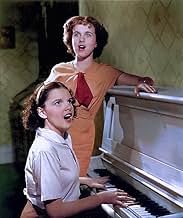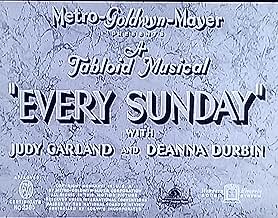Two teenage girls lend their fantastic singing voices to the cause when the city council threatens to replace the orchestra led by one girl's grandfather as the regular entertainment at the ... Read allTwo teenage girls lend their fantastic singing voices to the cause when the city council threatens to replace the orchestra led by one girl's grandfather as the regular entertainment at the Sunday concert-in-the-park series.Two teenage girls lend their fantastic singing voices to the cause when the city council threatens to replace the orchestra led by one girl's grandfather as the regular entertainment at the Sunday concert-in-the-park series.
Clem Bevans
- Man playing checkers
- (uncredited)
Jules Cowles
- Man in Audience
- (uncredited)
Paul Irving
- Mr. Bixby
- (uncredited)
Wright Kramer
- The Professor
- (uncredited)
Thomas Pogue
- Mr. Barfogle
- (uncredited)
Richard Powell
- Pop, Judy's Father
- (uncredited)
Kathryn Sheldon
- Woman Gotten out of Bath
- (uncredited)
Tammany Young
- Man Sleeping on Bench
- (uncredited)
- Director
- Writer
- All cast & crew
- Production, box office & more at IMDbPro
Storyline
Did you know
- TriviaThis film was not (as is often reported) a "screen test" of sorts produced by MGM to help the studio decide which of these two girls, Deanna Durbin or Judy Garland, to keep under contract. Durbin was released by MGM and signed by Universal prior to this movie's production. A blurb on 1 June 1936 in "The Hollywood Reporter" stated "Universal had changed Canadian-born Edna Mae Durbin's name to 'Dianna' [sic]." This movie, it appears, was not produced until at least July 1936, by which time Durbin had already been signed by Universal and cast in her debut vehicle, Three Smart Girls (1936). The reason she appeared in this film was reportedly due to a provision in her MGM contract which entitled the studio to request her services for up to 60 days following its termination, provided she was not already shooting a film at her new studio. As filming on "Three Smart Girls" was not scheduled to begin until September 1936, Durbin found herself back at MGM making this short with Garland. This is why, although her on-screen character is called "Edna" in the short (Deanna's real name), in the credits she is billed under the name by which she would soon become internationally famous, "Deanna".
- GoofsWhen the girls are singing, their mouths do not always match the soundtrack.
- ConnectionsFeatured in That's Entertainment! (1974)
Featured review
Instead of making foolish comments praising one over the other (like comparing apples to oranges), fans of JUDY GARLAND and DEANNA DURBIN ought to just sit back and relax while watching this harmless little piece of musical fluff made simply to give audiences a look at two up-and-coming stars of the future.
Durbin's fans are insisting that she was the superior talent with the real singing voice and Garland fans are insisting that even then she was beautiful and sings up a storm on something called "Americana"--which, by the way, Garland does handle with finesse even though it's not even worthy of all her energies.
But both of them perform in a professional manner. Durbin's soprano voice is lovely and there's no reason for someone to complain that this type of voice "should not be coming from a child" of fourteen, instead of giving credit where it's due. It's obvious that she already had lots of vocal training and was already capable of handling operatic material and there's nothing wrong with that.
Judy too is in good voice, even though I personally think the studio could have chosen a more memorable song than "Americana" for her to belt out.
Anyway, together they blend nicely in a simple story about two girls who decide to do something when the local band concert is not attracting enough patrons to the park. They take matters into their own hands and come up with the idea of performing with the band as an added attraction. The stunt works and before you know it, they've attracted a good sized audience.
Audiences in '36 were probably pleased to see two such talented youngsters demonstrating their musical skills in a short film.
Durbin's fans are insisting that she was the superior talent with the real singing voice and Garland fans are insisting that even then she was beautiful and sings up a storm on something called "Americana"--which, by the way, Garland does handle with finesse even though it's not even worthy of all her energies.
But both of them perform in a professional manner. Durbin's soprano voice is lovely and there's no reason for someone to complain that this type of voice "should not be coming from a child" of fourteen, instead of giving credit where it's due. It's obvious that she already had lots of vocal training and was already capable of handling operatic material and there's nothing wrong with that.
Judy too is in good voice, even though I personally think the studio could have chosen a more memorable song than "Americana" for her to belt out.
Anyway, together they blend nicely in a simple story about two girls who decide to do something when the local band concert is not attracting enough patrons to the park. They take matters into their own hands and come up with the idea of performing with the band as an added attraction. The stunt works and before you know it, they've attracted a good sized audience.
Audiences in '36 were probably pleased to see two such talented youngsters demonstrating their musical skills in a short film.
Details
- Release date
- Country of origin
- Language
- Also known as
- Каждое воскресенье
- Filming locations
- Production company
- See more company credits at IMDbPro
- Runtime11 minutes
- Color
- Aspect ratio
- 1.37 : 1
Contribute to this page
Suggest an edit or add missing content























